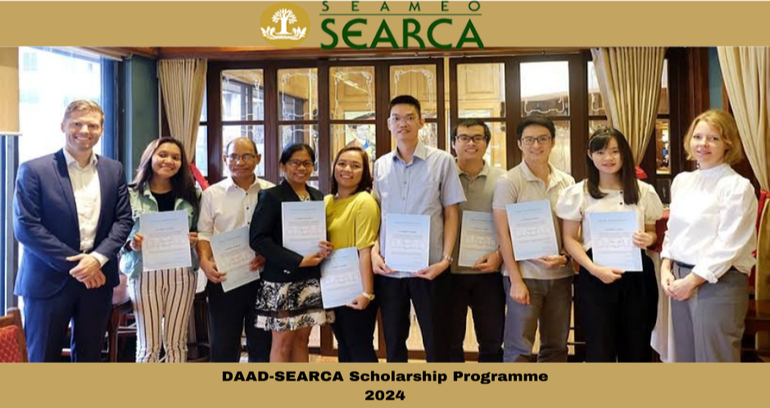The German Academic Exchange Service founded in 1925, is the largest German support organisation in the field of international academic co-operation.
DAAD is a private, federally funded and state-funded, self-governing national agency of the institutions of higher education in Germany, representing 365 German higher education institutions (100 universities and technical universities, 162 general universities of applied sciences, and 52 colleges of music and art).
The DAAD itself does not offer programs of study or courses, but awards competitive, merit-based grants for use toward study and/or research in Germany at any of the accredited German institutions of higher education. It also awards grants to German students, doctoral students, and scholars for studies and research abroad. With an annual budget of 522 million Euros and supporting approximately 140.000 individuals world-wide, the DAAD is in fact the largest such academic grant organisation worldwide. The organisation was founded on 1 January 1925 but closed down in 1945, only to be re-founded again in 1950.
The DAAD headquarters are in Bonn and there are 15 international regional branch offices that exist to provide information and advice on study and research opportunities, as well as available grants, tailored to students and academics within their region.
DAAD’s partnership with SEARCA started in school year 1975-1976 through a support to the Center’s graduate scholarship program leading to Masters and PhD degrees in agriculture. The first 15 beneficiaries of the DAAD support were graduate students from Cambodia, Indonesia, the Philippines, Thailand, and Vietnam. Ten scholarship recipients pursued their Master’s degree, while five pursued their PhD.
As of Academic Year 2023/2024, DAAD and SEARCA have awarded 419 Southeast Asian nationals from Cambodia (19), Indonesia (91), Lao PDR (10), Malaysia (15), Myanmar (30), Philippines (100), Thailand (82), Timor Leste (26), and Vietnam (46). Among the 419 scholarships, 206 pursued their MS, 208 pursued PhD, and 5 enrolled for Non-degree.
Benefits
- Covers tuition and other school fees; study and research allowance; printing allowance; stipend for food, lodging and incidental expenses; travel allowance (In-Region only); and insurance.
DAAD In-Country/In-Region scholarship holders are also encouraged to apply for a research grant in Germany for 2 to 6 months, at the time of application. The short-term research scholarship includes:
- A monthly scholarship payment for living costs.
- Health/accident/personal liability insurance.
- A flat-rate travel allowance.
Eligibilities
- Open to nationals of Cambodia, Indonesia, Lao PDR, Myanmar, Malaysia, Philippines, Timor Leste, Thailand, and Vietnam
- Must be (a) staff member of a public university, (b) or a candidate considered for teaching or research staff recruitment, (c) or from the public sector
- Must not be more than 35 (Master’s Degree) or 40 (PhD) years of age at the time of application.
- Have completed their last university degree not more than 6 years ago at the time of application.
- Proposed thesis research should focus on SEARCA’s overarching theme of Accelerating Transformation Through Agricultural Innovation (ATTAIN). Moreover, priority research topics must fall within the ATTAIN priority areas:
- Agri-Business Models for Increased Productivity and Income
- Sustainable Farming Systems and Natural Resource Management
- Food and Nutrition Security
- Transformational Leadership for Agricultural and Rural Development (ARD)
- Gender and Youth Engagement in ARD.
- Enhanced ARD towards Climate Resilience.
- EcoHealth/One Health Applications to ARD.
Application Process
- DAAD and SEARCA Application forms to be filled up online;
- Curriculum vitae, including a list of publications (if any);
- Duly stamped (if applicable) and signed recommendation letter by university teachers (one for MS, two for PhD);
- Notice of university admission or proof of application to the university;
- Certified true copies of diploma/certificate and transcript of academic records of each degree completed (BS diploma and TOR for MS applicants; BS and MS diploma and TORs for PhD applicants);
- Letter of motivation (1-2 pages for MS or 1-3 pages for PhD) with personal, social motivation as well as your reference to the studies and a Master project (for MS applicant) or PhD project (for PhD applicant);
- Copy of bio-page of the passport or a copy of National Identification Card;
- For research-based MS/PhD program: a timetable (if applicable, mentioning the planned research stay in Germany); For course-based MS/PhD program: semestral/term schedule and timetable;
- Brief description of the research the applicant plans to conduct for thesis/dissertation. The research topic must be in line with SEARCA’s overarching theme of Accelerating Transformation Through Agricultural Innovation (ATTAIN) with the following priority areas:
- Agri-Business Models for Increased Productivity and Income
- Sustainable Farming Systems and Natural Resource Management
- Food and Nutrition Security
- Transformational Leadership for Agricultural and Rural Development (ARD)
- Gender and Youth Engagement in ARD
- Enhanced ARD towards Climate Resilience
- EcoHealth/One Health Applications to ARD
- Certification from a medical doctor that the applicant is in good physical and mental health condition and is fit to undertake graduate studies;
- Official endorsement from the employer;
- Result of Test of English as a Foreign Language: TOEFL iBT result (80) or IELTS result (6.0). The TOEFL results must be issued by Princeton, New Jersey, USA. Check the schedule and venue of TOEFL tests in your country at http://www.ets.org/toefl. If this is not available at the moment, a certification from the previous study post that the applicant’s English proficiency is in the level of IELTS 6.0 may suffice.
- For PhD candidates, submit the following additional documents:
- Declaration of acceptance from the academic supervisor or a commitment letter from the intended study post that a supervisor will be assigned
- Detailed and precise PhD proposal (8-10 pages), including detailed work and timetable indicated with months and dates as well as information on when the last exam will take place (if applicable, mention the planned research in Germany). Concept note will not be accepted
- Abstract of the proposal on one page (please include name and title of proposal).
Application Deadline: January 31, 2024
Application ClosedOfficial link









